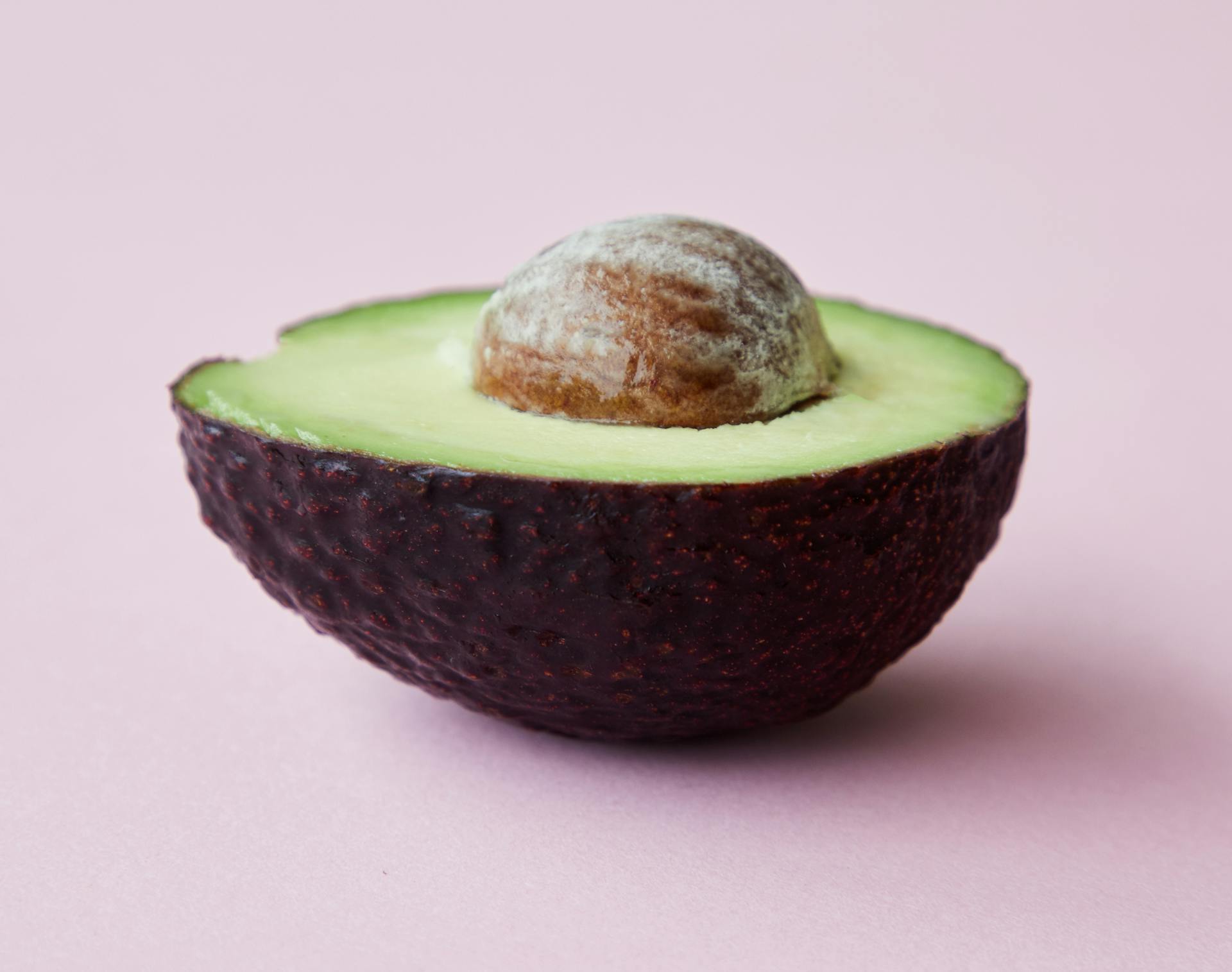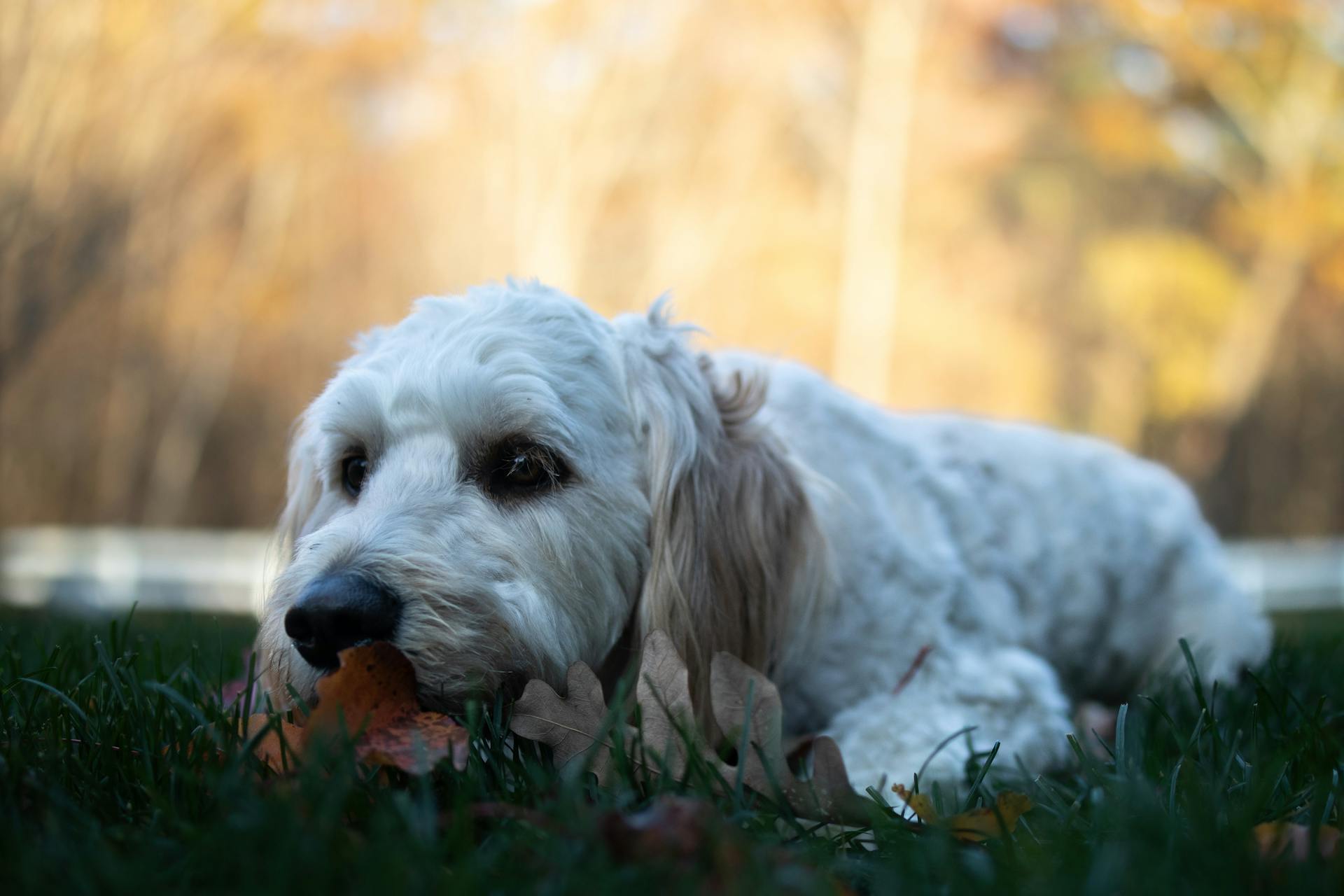
As a dog owner, it's natural to want to share your favorite fruits with your furry friend. However, not all fruits are safe for dogs to eat.
Some fruits, like grapes and raisins, are toxic to dogs and can cause kidney failure.
Dogs can also experience stomach upset from eating citrus fruits like lemons and limes due to their high acidity.
Oranges and tangerines, while not toxic, can still cause stomach upset in dogs due to their seeds and peels.
Recommended read: How Much Onion Is Toxic to a Dog
Fruits to Avoid
If you're considering sharing a snack with your furry friend, be aware that some fruits are toxic to dogs. Seeds from persimmons can cause problems in a dog's small intestine and even block their intestines. The pit from a peach or plum can also cause cyanide poisoning.
Some fruits are also a choking hazard, like the peel of citrus fruits like lemons, limes, and grapefruits. The pit of an avocado is a choking hazard as well. And if your dog eats the pit of a peach or plum, it can also block their intestines.
Recommended read: What Food Gives Dogs Diarrhea
Here's a list of fruits to avoid giving your dog:
Avocado
Avocados have a toxic substance called persin, which can cause vomiting and diarrhea in dogs if ingested in large amounts.
The concentration of persin is highest in the peel, but even the flesh contains too much for a dog to handle safely.
Dogs are relatively resistant to persin, but it's still not worth the risk, as avocados are not a nutritious food source for them.
Avocado seeds can become stuck in the intestines or stomach, potentially leading to fatal obstruction.
The pit is also a choking hazard, so it's best to keep it out of your dog's reach.
If your dog accidentally ingests any part of an avocado, contact your veterinarian for advice to avoid a lengthy visit to the vet.
Grapes and Raisins
Grapes and Raisins are a definite no-go for your furry friend. They can cause kidney failure in dogs, even in small amounts.
Vomiting is often an early sign of grape toxicity, and it can quickly progress to your dog becoming sluggish and depressed. If you suspect your dog has eaten grapes or raisins, call your vet immediately.
Some experts believe that grapes and raisins contain traces of mold that's toxic to dogs. However, the exact reason for this toxicity is still unclear.
If your dog consumes grapes or raisins accidentally, it's essential to contact your vet right away. Time is of the essence when it comes to treatment for grape toxicity.
Here's a list of fruits that are toxic to dogs:
Remember, it's always better to err on the side of caution when it comes to your furry friend's diet. If in doubt, consult with your vet for advice.
Dog Diet
Dogs can benefit from eating fruit, but only some types are safe for them. Fruits like apples, apricots, and bananas are okay in moderation, but be cautious of the seeds and pits.
Some fruits, like avocados and grapes, are toxic to dogs and should be avoided altogether. Eating these fruits can cause serious health issues, including kidney failure and acute liver failure.
If you do choose to feed your dog fruit, make sure to introduce it slowly and in small amounts to prevent digestive issues. A good rule of thumb is to start with small portions and observe your dog's reaction before increasing the amount.
Here's a list of fruits that are safe for dogs to eat in moderation:
- Apples (without seeds)
- Bananas
- Blueberries
- Cantaloupe
- Cranberries
- Honeydew
- Kiwi
- Oranges (flesh only)
- Pears
- Pineapple
- Raspberries
- Strawberries
- Tangerines
- Watermelon
Remember to always check with your vet before making any changes to your dog's diet, and to keep an eye out for any adverse reactions after introducing new fruits.
Specific Fruits
Peaches are a safe choice for dogs in moderation, but be sure to remove the pit as it can cause a life-threatening blockage.
Figs are another fruit that should be given in small amounts due to their high fiber content, which can lead to diarrhea in dogs.
The pit of plums is the main concern, as it can be sharp and damage your pet's esophagus, stomach, or intestines, and also obstruct the intestinal tract.
The pit of plums also contains cyanide, which is toxic to dogs, so it's essential to avoid giving them plums with the pit intact.
Citrus Fruits
The fleshy part of citrus fruits like lemons, limes, and grapefruits are quite acidic and can cause stomach upset.
Oranges are a safe and healthy treat for dogs to eat. They are a great source of vitamin C, potassium, and fiber.
Eating too many oranges can give any dog an upset stomach from the high acidity and sugar levels, so be sure to feed oranges as an occasional treat in small portions.
The peel of all citrus fruits presents a choking hazard and can also cause GI issues.
Here's an interesting read: Best Food for French Bulldogs with Sensitive Stomach
Coconut
Coconut is a great option for dogs with skin allergies, as its anti-inflammatory properties can help soothe irritated skin.

The anti-inflammatory properties in coconut can also help alleviate symptoms of inflammatory bowel disease (IBD) in dogs.
However, coconut can be a problem for dogs with sensitive stomachs, as its triglycerides can cause digestive issues.
Dogs prone to pancreatitis should also avoid coconut, as its triglycerides can exacerbate the condition.
Overweight dogs should be cautious when giving their pets coconut, as it's high in calories and can contribute to weight gain.
A unique perspective: Pumpkin Coconut Oil Dog Treats Frozen
Figs
Figs are a tricky fruit for dogs to eat. The high fiber content in figs can cause diarrhea in dogs.
If you do decide to feed your dog figs, be sure to limit their intake to one or two per week. This is because the fig plant contains a toxin called ficin.
Ficin can be an irritant to some dogs, causing symptoms like heavy drooling, vomiting, and diarrhea. Don't panic if this happens, though - the symptoms should pass.
The pit of a fig is not the only hazard, either - the fig plant itself can cause problems if your dog comes into contact with it.
Sources
- https://www.webmd.com/pets/dogs/ss/slideshow-foods-your-dog-should-never-eat
- https://www.pawlicy.com/blog/fruits-dogs-can-and-cant-eat/
- https://www.petmd.com/dog/nutrition/what-fruits-can-dogs-eat
- https://www.rspcapetinsurance.org.au/pet-care/dog-care/safe-diet-for-dogs
- https://petcube.com/blog/dog-fruits/
Featured Images: pexels.com


